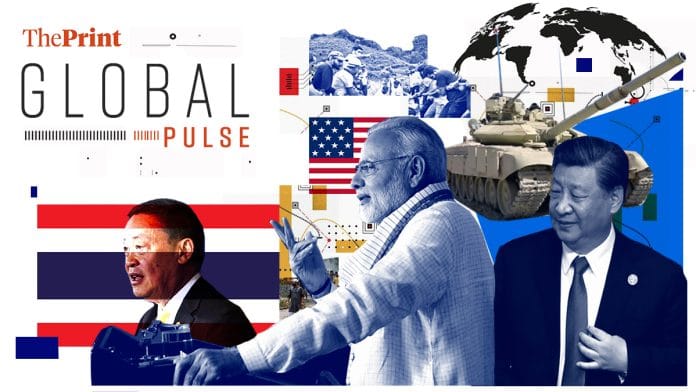New Delhi: India is now home to the world’s highest single arch bridge that connects the Kashmir valley to the rest of the country, writes Nikhil Inamdar in a report for the BBC.
The Chenab bridge, completed over 20 years, “faced delays and missed deadlines because of the region’s treacherous topography, safety concerns and court cases,” alongside logistical issues, adds the report, titled, ‘A new Kashmir rail bridge that could be a game-changer for India’.
It goes on to say that the bridge, 35m taller than the Eiffel Tower and part of Prime Minister Narendra Modi’s infrastructure push, is one component of an all-weather railway line that will boost connectivity and “give India a strategic advantage along the troubled border region”.
The US media is “seeking to sow discord between India and China,” says a report in Global Times by Liu Xuanzun, titled: VOA’s tank hype ‘aims to sow discord between China, India amid improving ties’.
It quotes Chinese experts dismissing a Voice of America report which suggested that India could deploy its newly unveiled indigenous light tank Zorawar along the Indo-China border. “The US media’s hype on military confrontation along the China-India border is unprofessional, and it exposes the US’ mentality of wanting to sow discord amid improving China-India ties,” one expert is quoted as saying. The report also underlines that the “game changer” tank will “not be ready before 2027”.
Su Lun seconds this viewpoint in an opinion for Global Times, writing that manipulation of public opinion “has been used to stir up misunderstandings and tensions between China and India”. In the piece, titled ‘US attempt to cause a rift between China and India over border issue deserves vigilance’, Su claims the US — who he says is not a “real friend” to India — is on “tenterhooks” as India and China improve their relationship.
“Detrimental to US global strategy and influence in the Indo-pacific, the improvement in China-India relations could serve as a crucial driver of regional peace,” he writes.
Search operations have been halted in Kerala’s Wayanad on account of rain, a little over a fortnight after deadly landslides claimed at least 350 lives in the landslide-prone district. Murali Krishnan in a report for DW questions whether India has been ignoring warnings from ecologists. There are “5,924 quarries in Kerala, including in the most ecologically fragile zones,” and Wayanad is one such zone, he writes notes.
In the report, titled ‘Climate change in India: Ignoring environmental warnings?’ Krishnan adds that with “quarrying and deforestation” being carried out in “unsuitable or dangerous locations,” Kerala is the most affected non-Himalayan state affected by landslides. He underlines that the crisis is being aggravated due to human-induced climate change leading to heatwaves and floods.
With an ambition to make science more accessible, approachable and easy to understand, science and art have been brought together at The Science Gallery in Bangalore, the seventh of a network spread across “America, Australia, Britain, Germany, Mexico, and Ireland”.
A report in the The Economist titled, ‘Why a new art gallery in Bangalore is important for Indian science,’ emphasises the importance of such spaces in India, which, it says “despite its reputation as a technology superpower, punches below its weight in science”.
“The idea is not just to bring research into the public space but to bring the public into research labs, too,” it explains, while also making note of the “allergy” to multidisciplinary institutions in the Indian education system.
Columbia president resigns, Thai PM dismissed
After months of criticism over her handling of pro-Palestinian student protests, Columbia University president Minouche Shafik announced her resignation Wednesday. To know more, read CNN’s report.
The Thai Constitutional Court has dismissed Prime Minister Srettha Thavisin for ‘breaching ethics rules’ with respect to a Cabinet appointment. To know more, read the BBC’s report.
(Edited by Amrtansh Arora)






